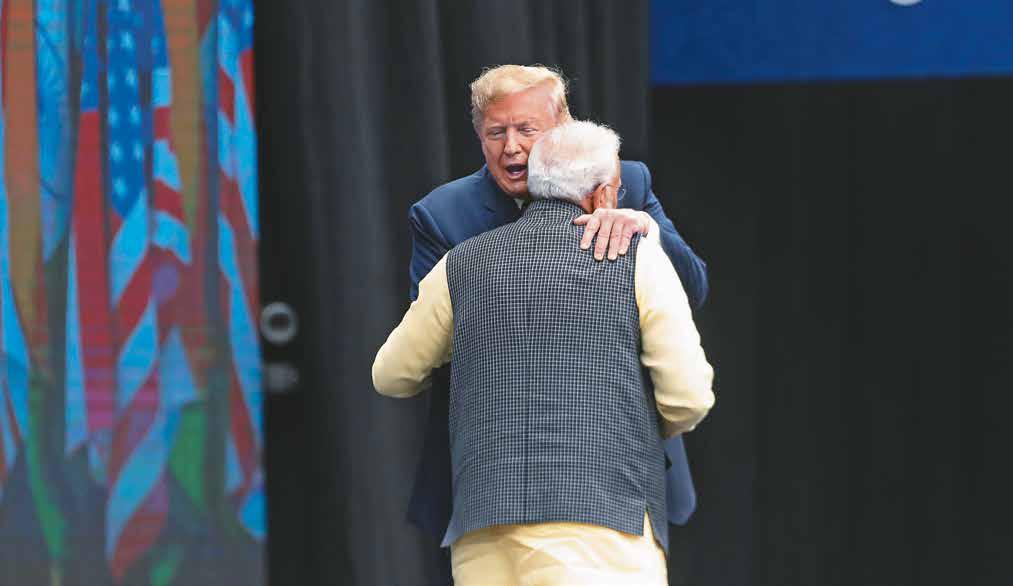
UNLIKE China, Iran, Russia or the Middle East, the world’s most populous country, India, has barely been mentioned in the US presidential election cycle. India is fortunate in that even in a deeply polarised American polity, close relations enjoy strong bipartisan support. The ideal for New Delhi would be that the next president’s administration takes the final steps towards converting the current comprehensive, global and strategic US-India partnership into ‘‘the defining partnership of the twenty-first century”. On the policy front, references to India during the campaign cycle have only been in passing. Both candidates support robust India-US relations and both parties have long-time experts in their ranks who are keen to deepen the partnership.
If Donald Trump returns, his presidency is likely to be characterised by strong personal relations with Prime Minister Narendra Modi. These will be coupled with a transactional foreign policy where public differences over trade, market access and immigration will have to balance strategic imperatives. A President Kamala Harris, on the other hand, like President Joseph Biden, is more likely to focus on strategic convergences, in seeing India as the ideal counterweight to China, and not allowing differences to become divergences.
The bedrock of the US-India partnership has been shared values and mutual strategic interests. The multi-faceted US-India partnership is underpinned by strong commercial ties, close defense cooperation and shared strategic considerations.
India’s strategic location, economic potential and military capabilities make it an ideal partner for the United States in a key spot: continental Eurasia and the maritime Indo Pacific. India is also an important partner as the US seeks to pushback against the military and economic rise of China, both in the Indo Pacific and beyond. India’s own decades old rivalry with China further strengthen these shared interests.
This story is from the {{IssueName}} edition of {{MagazineName}}.
Start your 7-day Magzter GOLD free trial to access thousands of curated premium stories, and 9,000+ magazines and newspapers.
Already a subscriber ? Sign In
This story is from the {{IssueName}} edition of {{MagazineName}}.
Start your 7-day Magzter GOLD free trial to access thousands of curated premium stories, and 9,000+ magazines and newspapers.
Already a subscriber? Sign In

Layers Of Lear
Director Rajat Kapoor and actor Vinay Pathak's ode to Shakespeare is an experience to behold

Loss and Longing
Memories can be painful, but they also make life more meaningful

Suprabhatham Sub Judice
M.S. Subbulakshmi decided the fate of her memorials a long time ago

Fortress of Desire
A performance titled 'A Streetcart Named Desire', featuring Indian and international artists and performers, explored different desires through an unusual act on a full moon night at the Gwalior Fort

Of Hope and Hopelessness
The body appears as light in Payal Kapadia's film

Ruptured Lives
A visit to Bangladesh in 2010 shaped the author's novel, a sensitively sketched tale of migrants' struggles

The Big Book
The Big Book of Odia Literature is a groundbreaking work that provides readers with a comprehensive introduction to the rich and varied literary traditions of Odisha

How to Refuse the Generous Thief
The poet uses all the available arsenal in English to write the most anti-colonial poetry

The Freedom Compartment
#traindiaries is a photo journal shot in the ladies coaches of Mumbai locals. It explores how women engage and familiarise themselves with spaces by building relationships with complete strangers

Love, Up in the Clouds
Manikbabur Megh is an unusual love story about a man falling for a cloud. Amborish Roychoudhury discusses the process of Manikbabu's creation with actor Chandan Sen and director Abhinandan Banerjee